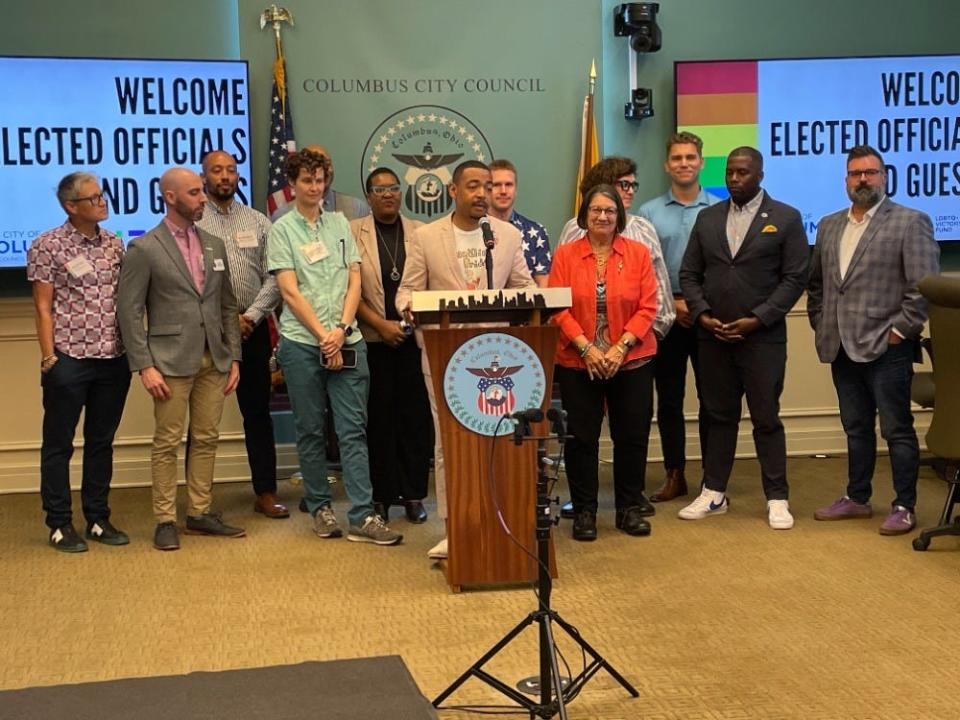'Pride needs to become more than just a party,' LGBTQ elected officials talk obstacles
Over 40 LGBTQ+ elected officials from around Ohio gathered at Columbus City Hall Friday, the day before many of them would march in the Columbus Pride Festival, to discuss hostile legislation and strategies to combat it.
This is the second time in two years City Council President Shannon Hardin invited LGBTQ+ officials to gather before Columbus’ Pride Festival. The gathering, which does not have an official name, is a way for elected officials to connect, talk about policy that harms the LGBTQ+ community and policies that can support it.
Following a private meeting where the group heard a presentation from Equality Ohio about harmful legislation in the statehouse, some officials addressed media about the purpose of the gathering including Hardin and Senate Minority Leader Nickie Antonio, D-Lakewood.
Read more: Why Ohio ranks poorly when it comes to safety for LGBTQ+ people
"As our movement has grown and become mainstream, Pride has become a party, a celebration of visibility,” Hardin said to reporters. “But today, as we face attacks from certain politicians and extremists who back them, folks who want to erase our love, who want to bully our kids, Pride needs to become more than just a party. It needs to be a show of force, of solidarity.”

Hardin said Pride must remain a political movement even as it becomes more commercialized, which is why they gathered that day to discuss policy.
Attendees included school board members, city council members, township trustees and healthcare providers from various cities.
Hardin and Antonio both said that Ohio being unwelcoming to LGBTQ+ people is a detriment to the state’s economy. Antonio said people who are a part of the LGBTQ+ community and people who are not are turned away because they want to live in a place that is welcoming to friends and family.
Council Communications Director Jose Rodriguez said that last year’s meeting produced a collaboration between several municipalities that funded the National Association of Social Workers.
More: The Power of Pride: 3 stories of Columbus LGBTQ+ people telling how they celebrate, endure
The funding helped train social workers to help transgender children living with the hostile environment that exists in Ohio, Rodriguez said.
Rodriguez said those discussions also helped coordinate resolutions in several cities that reminded people that transgender people live in Ohio and that they are supported.
Sam Duling, legislative analyst, said the discussions at Friday’s meeting included how Columbus can share the resources it has for LGBTQ+ people that cities further away do not provide.
City Council: Parking, ADA compliance and more raised at public hearing on Columbus' zoning overhaul
Duling said an example includes police training from the Kaleidoscope Youth Center, who has met with Columbus police about how to interact with people who have an LGBTQ+ background.
“Not every community that’s two hours away knows that that resource is there for them too.”
LGBTQ+ Victory Fund, an organization that works to help LGBTQ+ candidates win elections gathered names of officials to invite to the event, Rodriguez said.
“There is no closet big enough to contain us and hell no, we’re not going,” Antonio said.
@donovanhunt9
This article originally appeared on The Columbus Dispatch: Local leaders across Ohio discuss LGBTQ issues, policy before Pride

